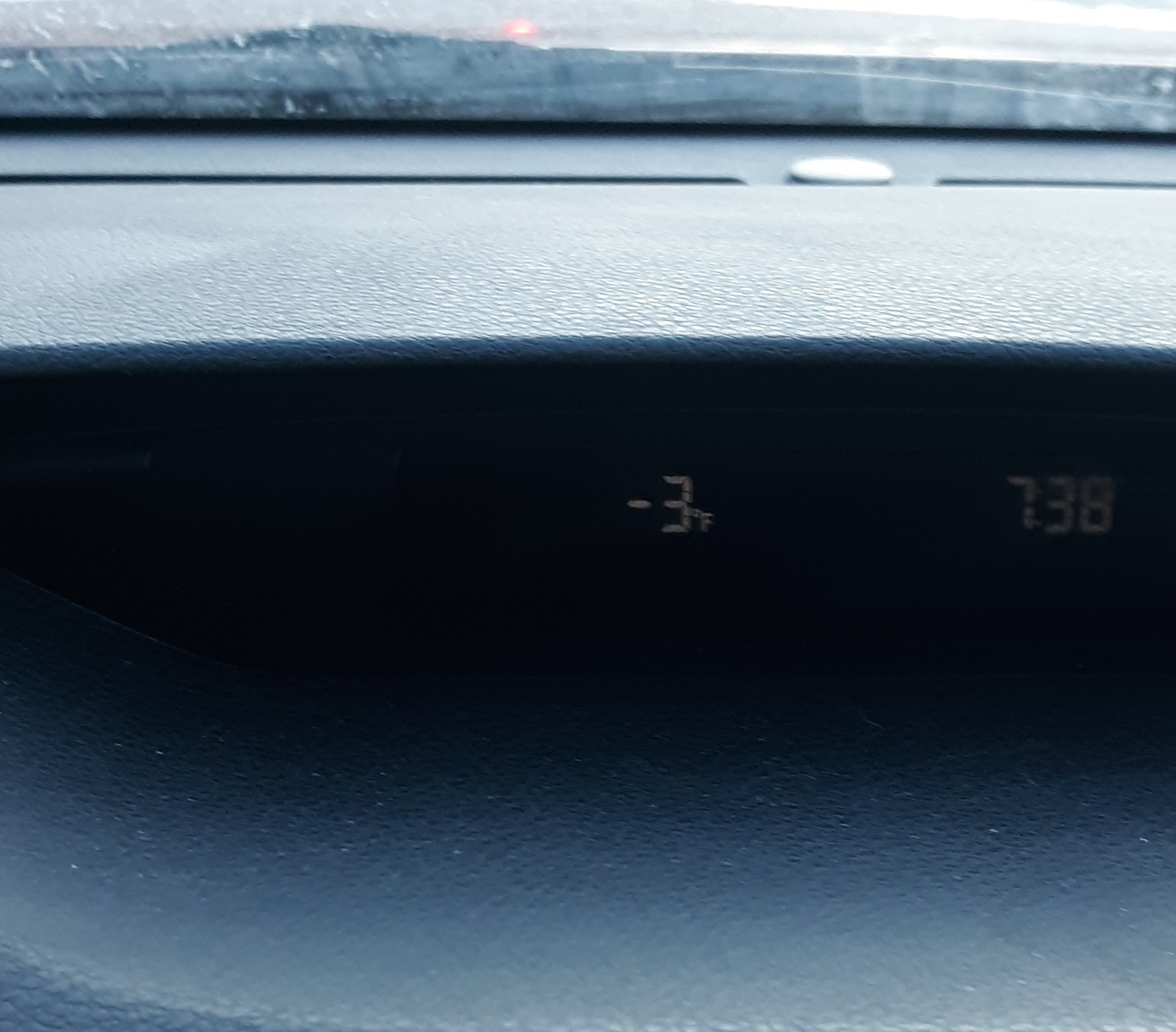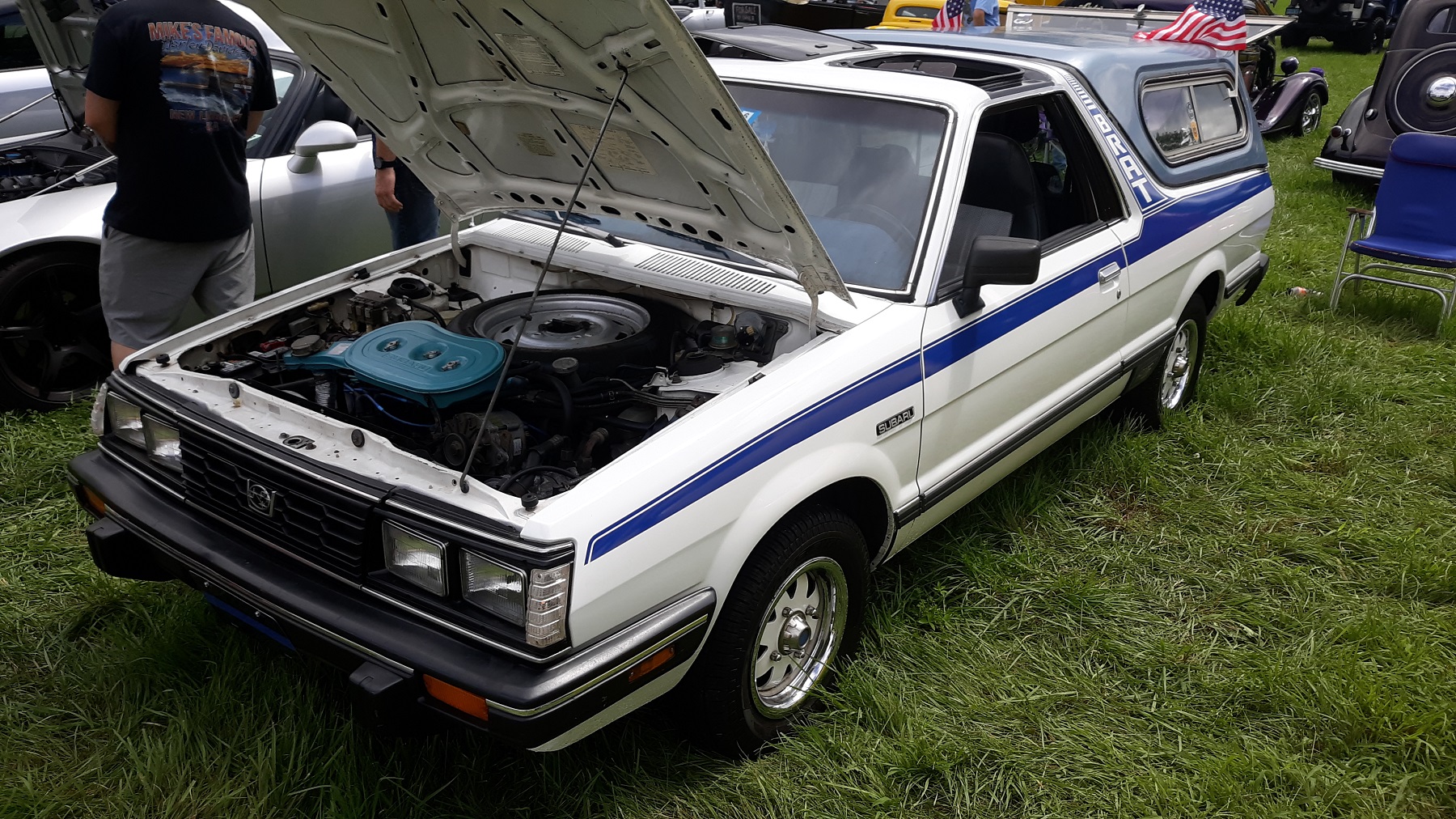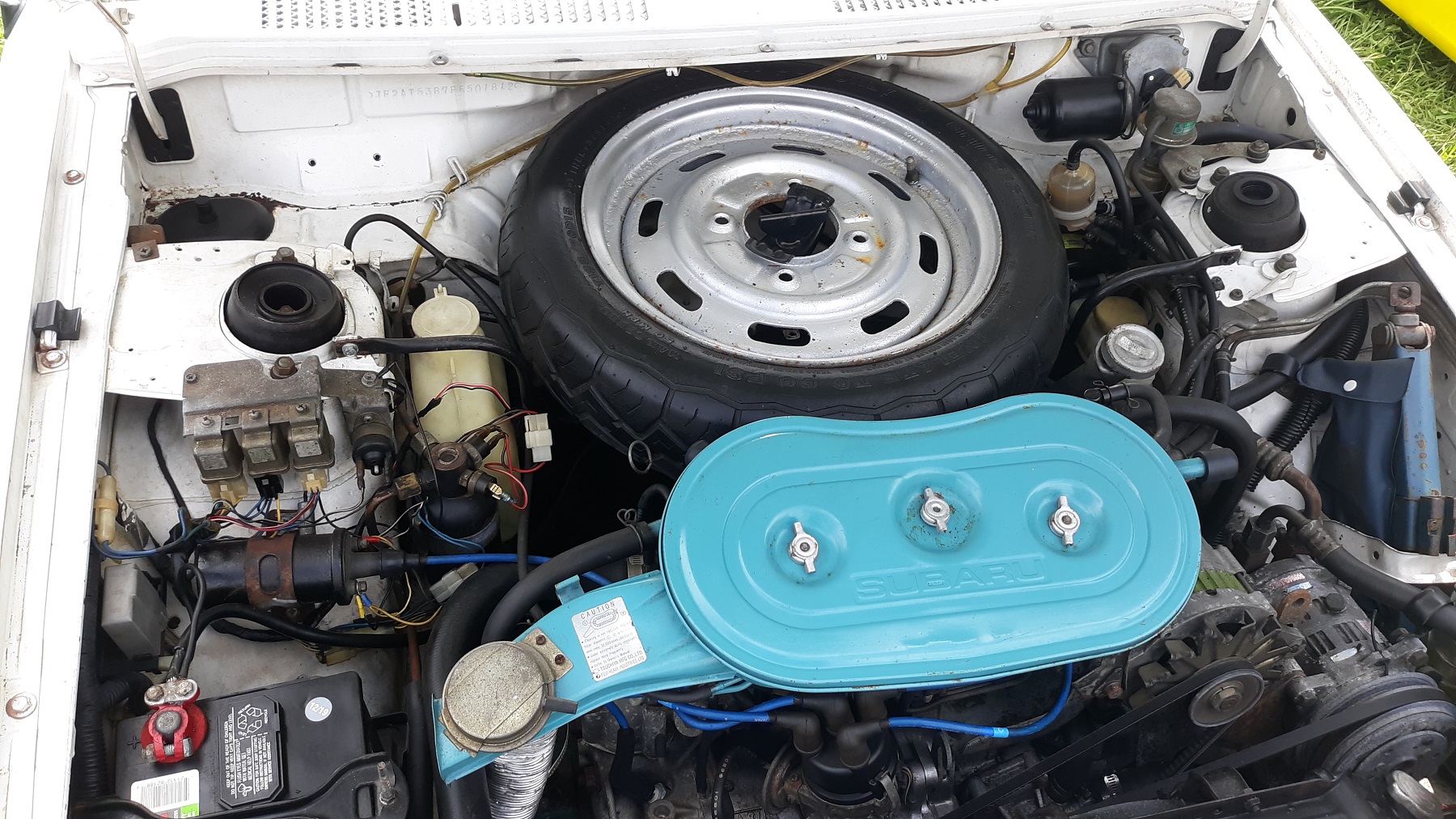
Stelcom66
Members-
Posts
182 -
Joined
-
Last visited
-
Days Won
1
Content Type
Profiles
Forums
Gallery
Store
Everything posted by Stelcom66
-
I'm also not a fan of leather, and really liked the heated seats in my '02 Outback and then Forester. One of the main reasons I went with the older Forester I have now, the Premium model with the all weather package. I considered a similar year Honda CR-V EXL, the only model with heated and powered seats, but leather. The heated cloth seats were most welcome last week on the way to work. Leaving the parking garage they're much appreciated too before the heater is able to produce heat. I can't imagine what -30º F would be like!
-
The 2012 I bought recently didn't have a spare key. I bought one from the local Subaru dealership. It was around $278 with the programing, No fob, just the key. It took a few days longer than expected. When asking the dealer about the ETA they said the key was cut by a 3rd party and they could only wait for it to arrive. Was kind of surprised to hear that, when I had a chip key cut for an older Honda several years ago they cut it right there at the dealership based on the VIN. The whole process took about 40 minutes with programing and I think cost around $80.
-
Finally after a 7 year hiatus, but routinely visiting this site and asking questions, I own a Subaru again. I couldn't eschew the desire. I know I could be asking for trouble with what I got - a 2012 Forester. I'm well aware of the issues with the FB25. I have not yet seen any signs of the cam carrier seals leaking, and have a quart and half of oil stored in the vehicle. Yesterday I checked the oil on a level surface, today in my driveway which slopes down a bit. Did that for reference as I'll be frequently checking the oil in the driveway. Buying vehicles with cash for years, this is low mileage for me, ~114,500 miles. I used to be a manual transmission fanatic - but I'm really liking the 4EAT. Unlike other 4EATs I've had in the past - this one doesn't seem to downshift at the slightest incline or increase in acceleration. With manual transmission Subarus that I've had (except for the 1985 GL) any minimal fuel savings were offset by clutch or throwout bearing replacements. I realize the efficiency of CVTs and am fine with their operation (had a company SUV with one), buying used as I do I thought it would be better to go with the 4EAT. If I was going to be commuting to work 5 days a week for years to come, which is not the case - I probably would have chosen otherwise. One feature I really like is Subaru (and maybe VW) may be exclusive in offering heated cloth seats in that era. That, and windshield and outside mirror deicers will be welcome in the New England winter.
-
That's what I did with my old Silverado. Unlike with the ABS fuse in, it's stops just fine. Over the years because of rust and other factors, I believe the sensors don't communicate that the wheel is turning at slow speeds, so the ABS interprets that as a skid and reacts accordingly. I'm sorry to hear the OP's situation is more complicated.
-
The Rav4 was nice, but if reliability of the Forester was equal to the RAV4, I'd pick the Forester. Oh boy - so noted, The oil level switch - does that turn the engine off if the level is too low? My 2002 Silverado, not being modern can go for weeks without being started in winter weather, then start fine like the other night. I heard maybe in 2018 there was a redesign in the FB25 that supposedly stopped or reduced oil consumption?
-
It sounds like for now your Forester is a capable vehicle, well suited for your environment. A big concern is what you mentioned about future parts availability, and the CVT as it ages. When it didn't adjust ratios when going uphill it seemed like extreme cases. I drove a 2014 Forester yesterday. When I got to the dealership is was running, found out because the battery was dead and it was jump started. Maybe a concern, but it's been very cold here lately and the salesman said it had been over a month since it was started. But - I've heard about parasitic drains in 2014 Foresters and Outbacks. Although with many other newer vehicles as well. Like you, I didn't notice any situation with the heat. It was a good day to test it, during the drive it was 19º. Not as good as my Tacoma and especially 2002 Silverado. but with the heat from the vents and the heated seat it was up to the task. I was fine with the CVT operation. Several years ago I had a company issued Jeep Patriot with the CVT and liked it, as I did in the 2014 Forester. The Jeep's was a Jatco, same as those used in Nissans. I believe most of the fleet experienced CVT failure or trouble at 110-120k miles. Yes, the newer Subarus are not the same. The F25 sounds like a conventional engine, I guess something due to the design of the exhaust manifolds being now of equal length unlike the EJ25. Over the years I've had 6 Subarus, 8 counting those my sons owned with my name on the title, My last 2 were EJ25s, prior to that the 2.2L, 1.8L and 1.6L(?) in my first one, a 1980 GL. I also drove a similar year Toyota Rav4. Not considering reliability, I preferred the Forester. So, both brands are in the running for me, Later this year my daily commute may be eliminated or reduced, so accumulating many miles will not be the case going forward. Thanks for posting the experiences and information. I'll need to consider a couple of concerns.
-
That's interesting, some say the heat is fine like yours. And if you're below zero this time of year often, that's even colder than here in Conn. First I heard of the computer actually limiting engine power when cold. There's a 2014 Forester Premium nearby with under 100k miles on it. That's low for me! I may check it out. Also an Outback around the same year.
-
Holy smokes! And one of the most surprising was the rod bearings. Maybe a manufacturing defect as I didn't think that was a situation on the FB25s. That was my concern with the EJ25 in the long run, but I know they're capable of over 200k miles with the usual maintenance, Another thing about the FB25s, and I don't know if it applies to the 2011-13 Foresters - but I've seen many reports of insufficient heating with 2014+ Foresters. Being in a cols climate, that's what I always liked about my former EJ25 Subarus - they were good winter weather vehicles, Heated cloth seats are great, and my preference over leather. Heat about was good as well, It's said the FB25 is more efficient, therefore less heat generated. I haven't seen the 2011-13 models mentioned as lacking heat. So much for the EJ25! Sold in a week or less.
-
Thank for the replies. I wouldn't be working on the engines, I respect those of you that do. I figured I might hear about that oil filter! For the FB25 cam carrier seal leaks, is it enough to periodically just wipe the oil off? I heard the oil can land on certain sensors and cause trouble. I've read where repairs are done out of warranty costing several thousand since it's an engine out repair. What are the consequences of not having that reseal done? I've heard where 60k or so miles later, it can need to be done again. Noted about the other parts. Resale isn't a concern as I'd (hopefully) be keeping it a long time, and not putting a lot of miles on.
-
I asked a similar question a few years ago. I'm at a point now where I may make a change. I test dove a 2010 and 2012 Forester. The dealership claims to replace the head gaskets and timing belts on all EJ25s they sell, and reseal the cam carrier on FB25s if leaking. Due to the oil consumption situation of the FB25, I thought I wouldn't even test drive the 2012, but I did. It felt a bit more refined than the EJ25, and didn't sound like a the typical flat 4. I realize that's due to some design differences. It seems rod bearing troubles are somewhat rare in the FB25, maybe because of the longer stroke and undersquare displacement? Most rod bearing failures I've read about are with the EJ25, some are turbos, some not. So, I could go with either I guess. I've owned many Subarus over the years, but haven't for a few years and may want to again. I wonder which, based on the experiences and expertise of many of those here whos opinions I value - would tend to be the better bet? If I got the EJ25 I'd be able to use the Fram PH3595 oil filter I still have in my garage. Both are Premiums, I like heated cloth seats, unique to Subaru in that era.
-
I know there's a ton of information about the FB25 cam carrier leaks, and I've done a lot of research. Of all of the forums, I trust the advice/opinions of this one the most. I've seen that although it's usually a seepage, it sometimes can drip onto sensors. Is it known of any other long term situations of not having the sealant re-applied? I know the leak can return over time. With that engine - checking oil I realize would be routine to do anyway. It seems the CVTs are relatively reliable in that era. Situations for me will be changing, and while I don't currently own a Subaru, but have owned many over the years - I'm considering an Outback or Forester in the 2016 year range. Are the 3.6 engines prone to the leak as well?
-
I'm in eastern Conn. The show was in Tolland, right over the Vernon line. It was huge! Does Premier Subaru also have a site in Watertown? I know it moved a couple years ago, down the street but into a different town. I serviced the phone system at their old site a couple times. Sounds like the Branford site is an interesting one. If you're ever at Family Garage in Bridgeport tell Scotty and Bobby Steve the phone system guy said hi! Photos of the '79 wagon would be great.
-
Went to a local car show today My son alerted me to it, said he saw a Subaru Brat turning into the lot. The front end of this looks just like the 1985 GL 4WD wagon I had, with the spare tire in the same place. I think it was a 1.8L. Mine was a 5 speed manual, great car.
-
I've read on here as @idosubaru said you're better off with a nonturbo EJ25. I don't know how valid Carfax is, but I looked at some of the maintenance history reports on some Foresters with the EJ25, I wish I was in the market for one because a few 2009-2010s that I looked at did have the headgaskets and timing belts replaced. I prefer manual transmissions, but given the reputation of the 4EAT and really no disadvantage in fuel economy -- I'd be fine with that. Consider a clutch replacement (which I had on a 2002 Forester) any slight fuel savings with a manual transmission is wiped out and then some, One thing I really like is Subaru has heated cloth seats. I saw that @Daskuppler has heated seats on order, I haven't heard trouble with those, is that common I wonder? I should have kept my 2002 Forester S. It would have been worth it to have the headgaskets replaced when the time came. When I bought it the dealer claimed to have replaced the timing belt as I requested.
-
Wow - that has the 3.0L H6, right? If I were to get an older Outback I guess the 3.0L option would be what to look for. I do see an occasional rare mention of head gaskets going bad. The rarity of that, and having a timing chain are big pluses. I have archives of some reviews of the 3.0L Outback, all very positive. With the 5EAT highway cruising at 65 mph was under 2,000 rpm, and overall fuel economy not that much worse than the 2.5L.
-
For me being a coupe would be a hinderance, I'd love to find a Subaru of that vintage with a 5 speed manual. I had the 1.8L in a 1985 GL wagon. That particular car ended up having a situation with I believe frequent low oil pressure, I believe it had an oil gauge, like my 20 year old truck. I wonder if the 1.8L engine has the same good reputation overall as the 2.2L? If I was in the market I'd buy the car for what it is - a coupe wouldn't be a show stopper because it's such a rarity with the 5 speed manual, and IMO a good looking era. I wouldn't modify it in any way, except for the radio. But I've never been mainstream, and probably around the same age as the interested buyer's parents.
-
Congrats and good luck! Now all of my kids (in their 30s) have vehicles newer than mine. Interesting you've got a '96 Legacy in the family, just for the heck of it looking around I saw a '96 for sale at a dealership, AWD so it must be an S and 5 speed manual and 2.2L which I like, Per the ad, about 77,000 miles which is questionable. Going for $2999. Also saw a 2001 H6 for double that and more than double the mileage. Cool you've got a '97 GMC truck, I've got a 2002 Silverado. I like older vehicles. Seems like a lot of mechanics do too, not necessarily because they work on them, but maybe the more basic and proven technology. I sure as heck wouldn't want my engine turning off every time I stopped. I don't need another vehicle, but can't help reading about and looking at older Subarus. Speaking of '98 Foresters - the same dealership as the others had 2 of them, one listing for $1 so I assume a bad engine. I've heard as troublesome as the DOHC was, once the headgaskets are replaced they're good for a very long time. Maybe it's an easy fix for the auto-start - one advantage and good reason to have an automatic.





